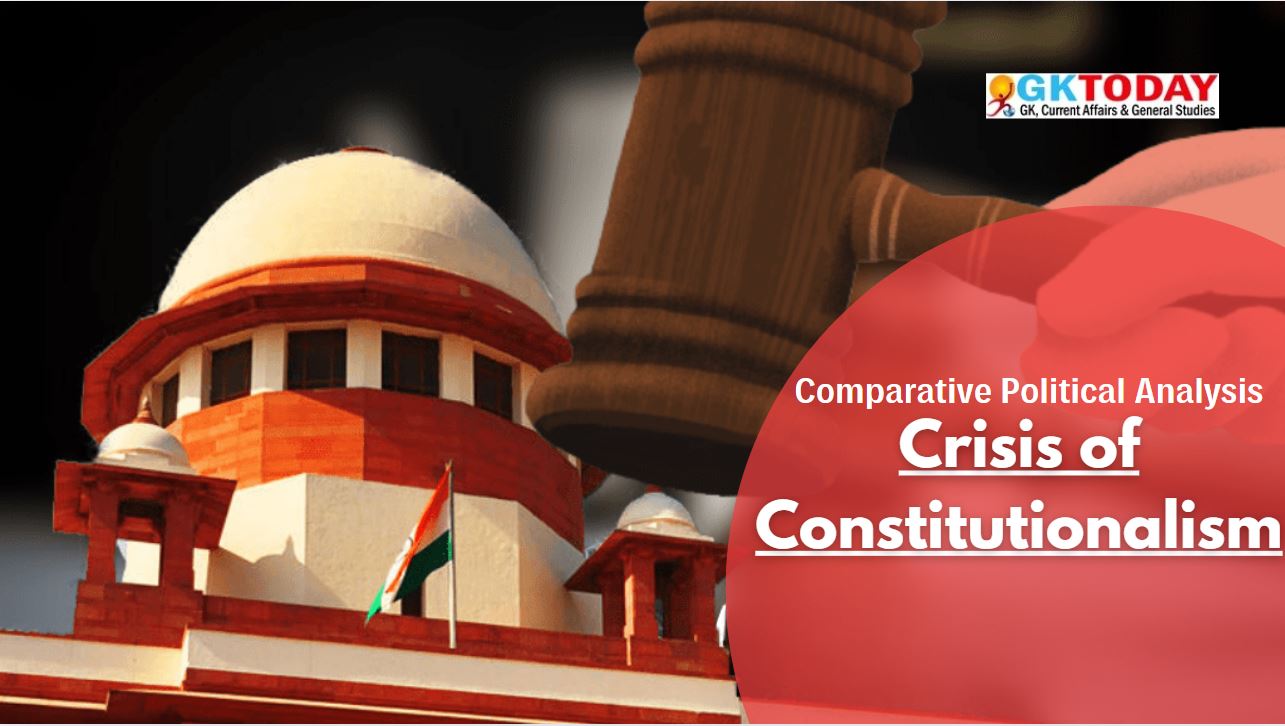Crisis of Constitutionalism in Political Science [UGC-NTA Net Political Science]
Constitutionalism is a foundational principle in political science. It asserts that government authority is derived from and limited by a constitution. This principle is crucial for maintaining the rule of law, ensuring the separation of powers, and protecting fundamental rights. However, in recent decades, various crises have threatened the integrity of constitutional frameworks worldwide.
Definition of Constitutionalism
Constitutionalism means that a government operates under a set of established laws. These laws limit governmental power and protect citizens’ rights. It includes:
- Rule of Law – All individuals and institutions are accountable to the law.
- Separation of Powers – Government functions are divided among branches to prevent abuse.
- Fundamental Rights – Basic rights, such as freedom of speech and assembly, are guaranteed.
Historical Context
Constitutionalism emerged prominently in the 18th century. Key events include:
- The Enlightenment – Philosophers like John Locke and Montesquieu advocated for limited government.
- The American Revolution – The U.S. Constitution established a framework for governance.
- The French Revolution – The Declaration of the Rights of Man emphasised individual freedoms.
These events laid the groundwork for modern constitutional democracies.
Causes of Crisis in Constitutionalism
Several factors contribute to the crisis of constitutionalism . These include:
- Authoritarianism: The rise of authoritarian regimes undermines established constitutional frameworks.
- Populism: Leaders often bypass constitutional norms to consolidate power.
- Judicial Overreach: Courts may exceed their mandates, creating tensions with other government branches.
- Political Polarization: Increased societal divisions hinder consensus on constitutional norms.
- Economic Crises: Economic instability prompts calls for emergency powers, risking constitutional rights.
- Globalization: International norms challenge national sovereignty and constitutional integrity.
Manifestations of the Crisis
The crisis of constitutionalism manifests in various ways:
- Erosion of Rule of Law: Legal frameworks and institutions weaken.
- Frequent Constitutional Amendments: Changes often aim to extend term limits or consolidate power.
- Civil Liberties Violations: Dissent, freedom of speech, and assembly are suppressed.
- Judicial Independence: Interference in judicial processes undermines impartiality.
- Political Instability: Frequent government changes disrupt continuity in governance.
Case Studies
Several countries illustrate the crisis of constitutionalism:
- Turkey: Under President Erdoğan, the shift from parliamentary democracy to a presidential system involved constitutional changes.
- Venezuela: The erosion of democratic institutions and rule of law under Chávez and Maduro illustrates constitutional decline.
- Hungary: Constitutional changes centralise power and weaken checks and balances.
- Poland: Judicial reforms perceived as undermining judicial independence raise concerns about constitutional integrity.
Responses to the Crisis
Various responses have emerged to address the crisis of constitutionalism:
- Civil Society Movements: Grassroots movements advocate for constitutional rights and democratic governance.
- International Pressure: Sanctions and diplomatic efforts by international organisations aim to uphold constitutional norms.
- Legal Reforms: Efforts to restore judicial independence and strengthen constitutional protections are underway in several nations.
Theoretical Perspectives
Different theoretical perspectives offer vital information about constitutionalism:
- Liberalism: Emphasises individual rights and the importance of constitutional frameworks.
- Marxism: Views constitutionalism as a tool for the ruling class to maintain control.
- Post-Colonial Theory: Critiques Western models of constitutionalism, advocating for indigenous frameworks.
Future of Constitutionalism
The future of constitutionalism faces several challenges:
- Adaptation: Constitutions must evolve with changing political, social, and economic contexts.
- Global Trends: Transnational governance and human rights norms increasingly influence national constitutions.
- Digital Age Challenges: Technology impacts privacy, surveillance, and the exercise of rights, necessitating new constitutional considerations.
Key Concepts
About key concepts is essential in the study of constitutionalism:
- Rule of Law: Ensures that law applies equally to all individuals.
- Separation of Powers: Divides government responsibilities into distinct branches.
- Checks and Balances: Mechanisms prevent any one branch from gaining excessive power.
- Fundamental Rights: Basic rights and freedoms guaranteed to individuals.
Important Figures
Several influential figures have shaped the discourse on constitutionalism:
- James Madison: Advocated for the separation of powers and checks and balances in the U.S. Constitution.
- Alexis de Tocqueville: Analysed the effects of democracy on society and governance.
- Hannah Arendt: Explored the nature of power and authority in political systems.


